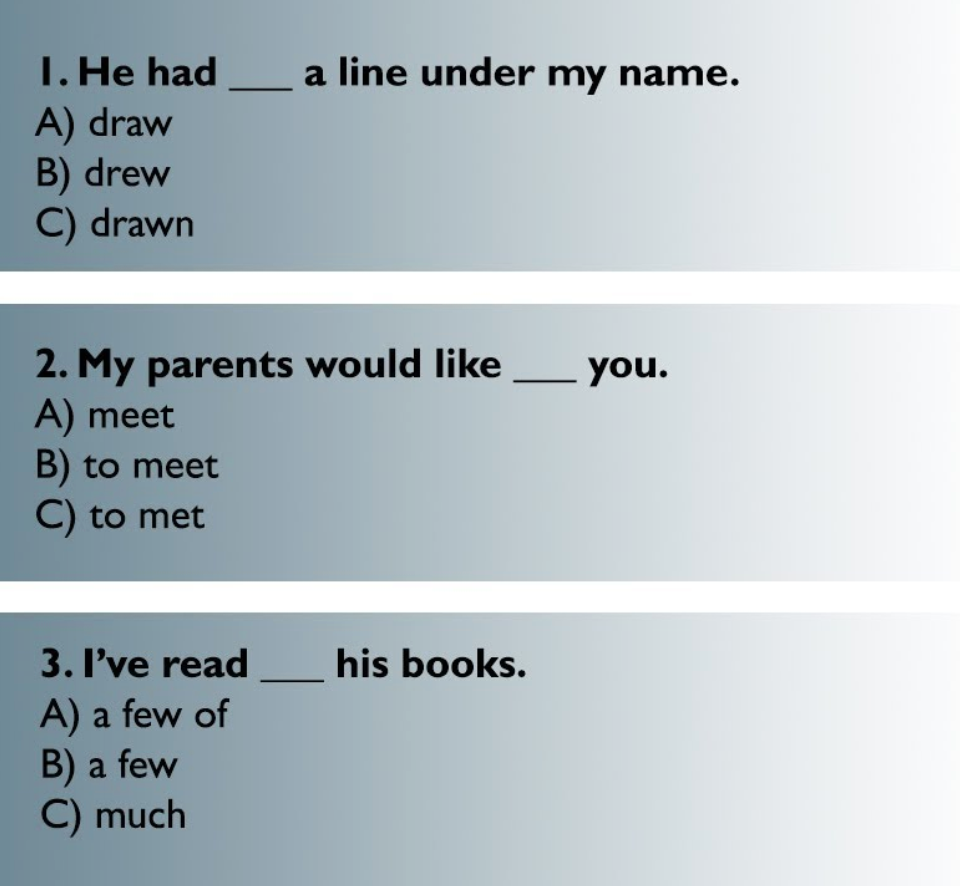<< Hide Menu
Fiveable SAT Writing and Language: Standard English Conventions to Know
3 min read•july 11, 2024
Jed Quiaoit
Jed Quiaoit
Grammar… Who?
If your English teacher introduced grammar at some point as "something you might not have heard of," you may have panicked for a bit. Don't worry! Grammar just refers to the "study of words." It explores how we use words in sentences and how they change depending on the situation 📙.
Wanna hear a little surprise? We actually incorporate and apply grammar in our daily lives–from texting friends to writing essays to debating who's the best rapper of the early 2020s. Still don't believe me? Try answering the three fill-in-the-blanks below:

Image Courtesty of EnglishTestBlog
Now, one way of approaching any of these three questions is through process of elimination (POE), which is a common test-taking strategy you can use to take the SAT. For example, with question 1, "He had draw a line under my name" doesn't sound right. So we can eliminate that answer choice. If we follow this same strategy, we would learn that drew in the context of the sentence also does not work. Therefore, answer C, which would complete the sentence as "He had drawn a line under my name" is the answer.
That's exactly what I mean about grammar being of second nature to us. If you answered B and A for #2 and #3, respectively, then pat yourself on the back–you're on your way to becoming the next grammar genius in town 🏆!
Standard English Conventions on the SAT
Now, let's talk about everyone's favorite standardized test in town: the SAT. Within its Writing and Language section, you'll deal with questions regarding Standard English Conventions. Here's what the College Board says about them:
"This is about the building blocks of writing: sentence structure, usage, and punctuation. You’ll be asked to change words, clauses, sentences, and punctuation. Some topics covered include verb tense, parallel construction, subject-verb agreement, and comma use." Sounds like a lot to take in? Let's break it down further! 💥
-
- Building Blocks of Writing- - Sentence Structure: the way words and phrases are organized within a sentence to convey meaning- - Your job is to recognize and correct sentence formation problems and inappropriate shifts in sentence construction- - Conventions of Usage: observing standard usage practices- - These conventions ensure clarity, especially with word choice to avoid ambiguous language, and consistency with style and tone.- - Conventions of Punctuation: observing standard punctuation practices
-
- Editing/Revising Tasks- - Change words, clauses (group of words with subject and verb), and/or sentences- - Change punctuation
-
- Additional Topics- - Verb tenses (past, present, future, etc.)- - Parallel structure ("He loves to walk, dance, and eat.")- - Subject-verb agreement ("I eat" vs. "I eats")- - Comma use To help you out with your studying, we created three resource pieces that dive into each of the building blocks of writing. We'll go super in-depth in the following pieces. Take a look here:

© 2024 Fiveable Inc. All rights reserved.